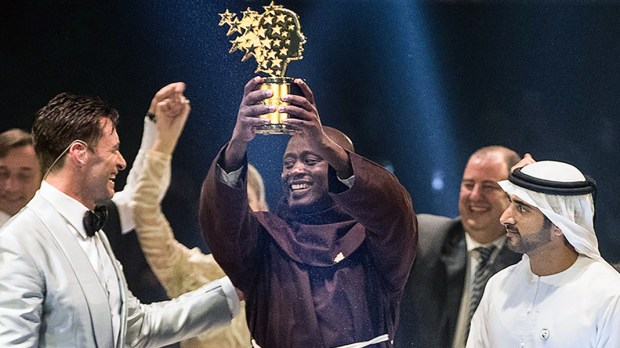Some students at Keriko Mixed Day Secondary School have to walk miles to Pwani Village, where the school is situated in a remote, semi-arid part of Kenya’s Rift Valley. Most of the students are from poor families. Almost a third are orphans or have only one parent. Many go without food at home. Drug abuse, teenage pregnancies, dropping out early from school, young marriages and suicide are common.
The area experiences regular bouts of drought and famine. During the rainy season, the roads to school can become impassable. And when students finally get to Keriko Mixed Day Secondary School, they have to share classrooms with some 60 other classmates.
The school has only one computer, and the internet connection is poor. But that hasn’t stopped youngsters in the past from excelling, and it doesn’t stop Franciscan Brother Peter Tabichi from expecting great things from his charges.
Brother Tabichi, a science teacher who takes his vow of poverty seriously by donating 80 percent of his monthly income the poor, just won the Varkey Foundation’s Global Teacher Prize. The priest comes with a $1 million purse.
The Varkey Foundation was started by educational entrepreneur Sunny Varkey, a native of Kerala, India, to promote education.
Tabichi gets online educational content by visiting internet cafes and using resources offline in class, according to his profile on the Varkey Foundation website:
Peter started a talent nurturing club and expanded the school’s Science Club, helping pupils design research projects of such quality that 60% now qualify for national competitions. Peter mentored his pupils through the Kenya Science and Engineering Fair 2018 – where students showcased a device they had invented to allow blind and deaf people to measure objects. Peter saw his village school come first nationally in the public schools category. The Mathematical Science team also qualified to participate at the INTEL International Science and Engineering Fair 2019 in Arizona, USA, for which they’re currently preparing. His students have also won an award from The Royal Society of Chemistry after harnessing local plant life to generate electricity. Enrollment has doubled to 400 over three years, and cases of indiscipline have fallen from 30 per week to just three. In 2017, only 16 out of 59 students went on to college, while in 2018, 26 students went to university and college. Girls’ achievement in particular has been boosted, with girls now leading boys in all four tests set in the last year.
“Every day in Africa we turn a new page and a new chapter. Today is another day,” Tabichi told the foundation. “This prize does not recognize me but recognizes this great continent’s young people. Seeing my learners grow in knowledge, skills and confidence is my greatest joy in teaching. When they become resilient, creative and productive in the society, I get a lot of satisfaction, for I act as their greatest destiny enabler and key that unlocks their potential in the most exciting manner.”
Actor Hugh Jackman presented the award March 23 at the Global Education and Skills Forum in Dubai.

